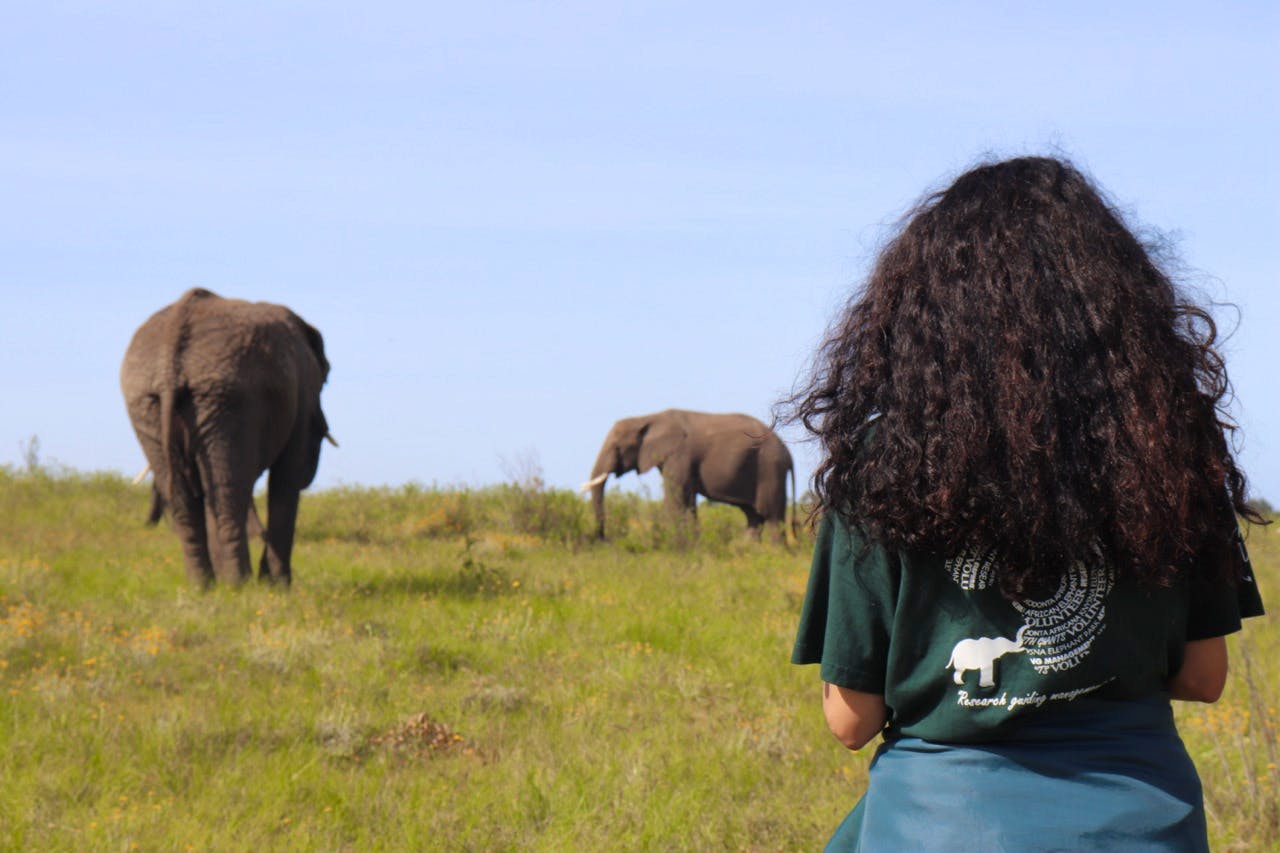Elephant Monitoring Immersion Experience





Highlights
- Observation : Shifts during the day in a stunning landscape monitoring elephants up close; night time observation of behaviour and sleeping activity, where you may see them laying down to sleep!
- Dung walk : Twice a week, we collect dung samples for laboratory processing and analysis. Join us during elephant breakfast and the morning walk as we look for some poop!
- Meet Harry's Herd : During a private safari, meet our gentle giant Harry and his herd (VIP experience) !
- Environmental education: Join our educational program by visiting schools and helping us teach children about the environment, biodiversity, and wildlife conservation.
- Creative time : A lovely way to end your day ! Be creative and make AERU crafts to raise funds for our research.
Especially good for
About the program
Immerse yourself in everything elephant with a week or two of learning, observing and walking with our family of gentle giants!
Why is our program important?
AERU plays a crucial role in using research as a tool to guide elephant management on the Knysna Elephant Park. Our research investigates the behaviour and social dynamics of African elephants with one another, as well as their interactions with tourists. This important ...
Typical day
Here are two examples of typical days :
Monday
7:00/8:30 = Dunk walk
8:30/10:00 = Observation shift
10:00/11:30 = Lab
11:30/13:00 = Lunch
13:00/14:30 = Observation shift
14:30/16:00 = Elephant enrichment camp
16:00/17:00 = Creative session (crafting)
Friday
7:30/8:30 = Night camp cleaning
8:30/9:30 = ...
Free-time activities
Our program is located between Knysna and Plettenberg Bay offering the vast natural and world renowned beauty of the Garden Route in all its splendour. During your free time and off days, you can visit some of the wonderful facilities near by the park, go for a hike among the mystical forests or ...
Requirements
What's Included
What's NOT included?
Details on arrival
Start dates:
2025 (all year except April and November)
05/01 __16/02 __ 30/03__ 11/05 __ 22/06
13/07 __ 03/08 __ 14/09 __ 26/10 __ 07/12
2026 (all year except February, August and December)
18/01 __ 01/03 __ 12/04 __ 24/05 __14/06
26/07 __ 06/09 __ 18/10 __ 29/11
Details on arrivals:
All international flights arrive in/ depart from Johannesburg or Cape Town and must travel to/from either George or Plettenberg Bay in the Garden Route.
For arrival/departures to our base at the Knysna Elephant Park, from the George Airport (more or less 1h30 driving), taxi transfers can be arranged for you (at your own cost).
All taxi transfers require cash available to pay the driver upon pick up/drop off (about R1100/62$/58€ one way).
Bus travel to Plettenberg Bay is an alternative option of travel. Although more cost friendly, the journey is lengthy. From Cape Town it is about 8 hours and Johannesburg it is about 15 hours. We can arrange to pick you up at the Plettenberg bus station (organise that with your correspondent at AERU in advance).
- Arrivals
Sunday arrivals are planned so as to allow our volunteers who are staying a shorter period of time to get the most out of their experience. AERU can be contacted to help arrange transport where needed (at your own cost).
- Departures
Departing flights can be arranged anywhere along the departing weekend (typically Sundays), taxi transfers can be arranged (at own cost).
Program fees
Meet your organization

African Elephant Research Unit
Non-profit - founded in 2009
Verified by Volunteer World
Coordinated by
Jarrett
About the project
23 reviews ·  4.9
4.9
Location

You might also be interested in
-
African Elephant
Elephant Research
Planting Trees
Elephant Conservation
Animals in South Africa
Animals in Africa
Big 5
Voluntouring
Couples
Under 18s Volunteering
Mission Trips to Africa
Elephant Wildlife Sanctuary
Best Volunteer Programs
Projects Abroad
High School Volunteering
Elephant Sanctuary in South Africa
Wildlife in South Africa
Group Volunteering
Planning a Gap Year in South Africa
Mission Trips
African Wildlife
Global Volunteer Opportunities
Adults
50 Plus Volunteering
Volunteer Trips for College Students











